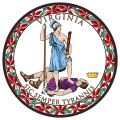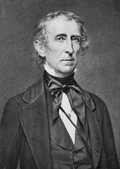Thomas Walker Gilmer
Thomas Gilmer | |
|---|---|
Speaker of the Virginia House of Delegates | |
| In office 1839–1840 | |
| Preceded by | Linn Banks |
| Succeeded by | Valentine W. Southall |
| Personal details | |
| Born | Thomas Walker Gilmer April 6, 1802 Albemarle County, Virginia, U.S. |
| Died | February 28, 1844 (aged 41) Potomac River, Maryland, U.S. |
| Resting place | Mount Air Cemetery Gilbert, Virginia, U.S. |
| Political party | Whig (Before 1842) Democratic (1842–1844) |
| Spouse | Anne Baker |
| Children | 9 |
Thomas Walker Gilmer (April 6, 1802 – February 28, 1844) was an American statesman. He served in several political positions in Virginia, including election as the 28th Governor of Virginia. Gilmer's final political office was as the 15th Secretary of the Navy, but he died in an accident ten days after assuming that position.
Personal life
Gilmer was born to George Gilmer and Elizabeth Anderson Hudson at their farm, "Gilmerton", in Albemarle County, Virginia. He was taught by private tutors and his uncle Peachy Ridgeway Gilmer in Charlottesville and Staunton, and studied law in Liberty (now Bedford), Virginia.[1][2][3][4]
Gilmer
On 13 May 1826, Gilmer married Anne Elizabeth Baker of
In 1829, Gilmer purchased Israel Jefferson, a former slave of Thomas Jefferson, who is best known for claiming that Sally Hemings was Thomas Jefferson's concubine. Gilmer later agreed to let Israel pay his own purchase price for his freedom after Gilmer's election to congress, as Israel desired to stay with his wife, a free woman.[5]
Political career

Gilmer first served in the
On February 14, 1840, Gilmer was elected the
In March 1841, he entered the
As one of President John Tyler's close
Electoral history
In 1842, Gilmer was elected to the
Legacy
Gilmer is buried at Mount Air Cemetery in Gilbert, Virginia.
A year after his death, Gilmer County, Virginia was named in his honor;[2] it is now part of West Virginia.
The city of
Two ships of the United States Navy over the years have been named USS Gilmer in his honor.
Notes
- ^ a b c d e Jamerson, p. 61
- ^ a b c d e Lewis, p. 686
- ^ Markham, Thomas A. "A Bit of Town History: A Bit of History of "Old" Liberty/Bedford, Virginia". Retrieved 2008-10-27.
- ^ Shaffer, Wade (2000). "Gilmer, Thomas Walkerunlocked (06 April 1802–28 February 1844)". American National Biography. Retrieved 17 October 2021.
- ^ "The Memoirs of Israel Jefferson". PBS. Retrieved 29 November 2012.
- ^ "GOGGIN, William Leftwich, (1807 - 1870)". Biographical Directory of the United States Congress. Retrieved 11 March 2016.
- ISBN 978-0-8078-3041-3.
References
- United States Congress. "Thomas Walker Gilmer (id: G000218)". Biographical Directory of the United States Congress.
- Jamerson, Bruce F., Clerk of the House of Delegates, supervising (2007). Speakers and Clerks of the Virginia House of Delegates, 1776-2007. Richmond, Virginia: Virginia House of Delegates.
{{cite book}}: CS1 maint: multiple names: authors list (link) - Lewis, Virgil Anson (1887). History of West Virginia. Hubbard Brothers, Philadelphia. p. 686. Retrieved 2008-10-27.
gilmerton albemarle virginia gilmer.







